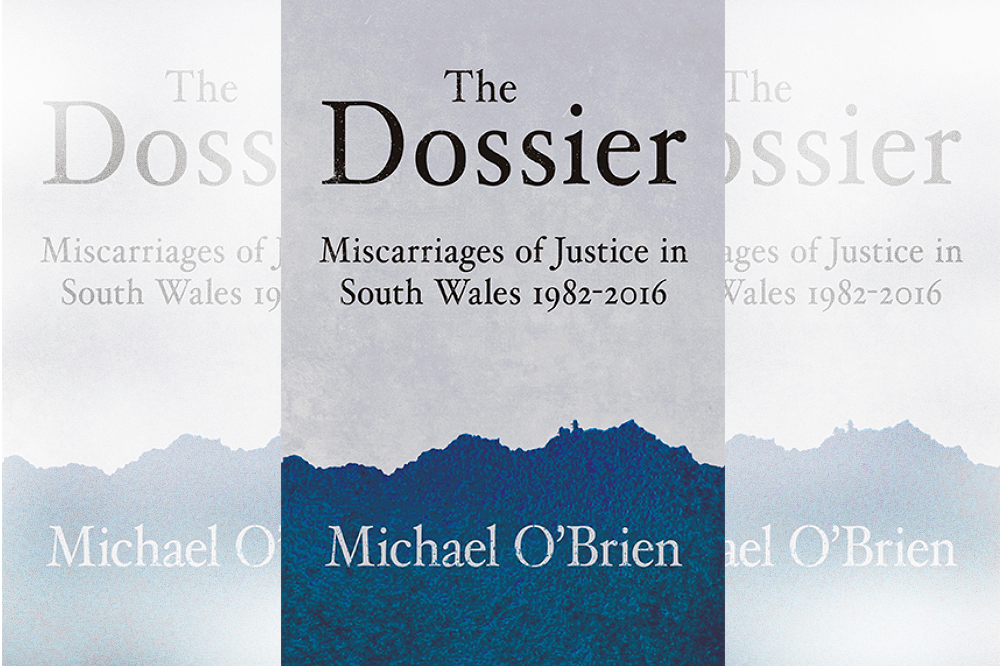Review: The Dossier – Miscarriages of Justice in South Wales 1982-2016 by Michael O’Brien

Jon Gower
When the police sledge-hammered their way through a front door in Grangetown, Cardiff on November 1st, 1987 to arrest Michael O’Brien for murder and robbery his sister-in-law Mandy shouted at them: “What the hell did you smash the door down for? We were opening it anyway.” To which one of the officers replied: “We can do what we like.”
The Dossier offers plentiful evidence of that belief being put into practice in a catalogue of intimidations and false confessions, often obtained after interviewing under duress, or after the accused has been chained to radiators, denied sleep, or food or often access to a solicitor.
In the case of O’Brien the case made against him when he was accused of the brutal murder of Cardiff newspaper vendor Phillip Saunders hinged, in large part, on the confession of Darren Hall, a witness described in a probation report as a “Walter Mitty”character, who changed his story eight or nine times during forty-eight hours of interviews.
As a consequence of Hall’s confession O’Brien spent his twenties behind bars until Karen Voizey, a researcher from BBC Wales’ Week In, Week Out programme examined the case, which ultimately led to the Court of Appeal and exoneration for O’Brien and the two others falsely implicated in the crime.
That story fills half of this book, while the other half sums up other prosecutions involving serious allegations of police misconduct in South Wales spanning almost four decades in a chain of cases which resulted in twenty three people collectively spending over eighty years in prison.
The book represents O’Brien’s second attempt (after his previous book The Death of Justice) to highlight what he suggests is a pronounced pattern of dubious practises by some members of South Wales Police, sufficient, he maintains, to warrant a judicial inquiry led by a high court judge.
False evidence
He names senior police officers including two, Stuart Lewis and Don Carsley – who became Detective Chief Inspector and Detective Chief Superintendent respectively – as particular causes for concern and then goes on to list in detail the multiple grounds for such concern.
Lewis’s name comes up repeatedly in cases such as ‘The Welsh Conspiracy Trial’ of nine men accused of an arson campaign against English holiday homes. As O’Brien details the case against them he shows that it ‘centred mostly on verbal admissions and cell confessions “overheard” by Lewis, together with innuendo, admissions allegedly made by defendants during interviews, and the fact that the defendants were Welsh nationalists.’
Some of those who recalled their arrest and trial, recalled Lewis offering £10,000 to make a statement that Dafydd Elis-Thomas, who was then Chairman of Plaid Cymru and a sitting M.P was involved in the campaign.
False evidence was planted, while a man called Robert Parfitt was placed in a cell with various of the men while they were on remand, waiting for his own trial: he claimed to have heard confessions from them.
When the Criminal Cases Review Commission examined the case made against Robert Griffiths, David Burns, Nicholas Hodges and five others who stood trial in 1983 it found that:
The case aginst Mr. Griffiths depended on the veracity of police evidence concerning admissions he was alleged to have made to DI Lewis in an alleged cell confession. The prosecution case against Mr Burns was similar and his defence centred on the veracity of the evidence of a number of police officers, particularly that of DI Lewis. The evidence against Mr. Hodges involved a signed confession, which he said was obtained by threats and undue pressure (allegedly by Lewis and other officers). All three defendants were acquitted.
The flagrant abuse of the system detailed in this case and others includes officers dictating their own answers to questions, the use of off-the-record interviews coupled with intimidation of various kinds not to mention disappearing evidence.
There is also a pattern of ‘confessions’ extracted as a result of what one barrister described as “oppressive questioning,” or, most strikingly, a written statement confessing his crime by a man who could neither read nor write, who simply signed the document put in front of him.
This led to a life-sentence and to his dying behind bars. Sadly, that too is a pattern, where people have died before their names are cleared, and sometimes in prison, their lives stolen from them.
The Dossier makes a very persuasive case for re-examining many of these cases under the aegis of a judicial inquiry. One hopes that one of the people also reviewing its sobering and often forensic content is Jeremy Vaughan, the current Chief Constable of South Wales Police.
The Dossier: Miscarriages of Justice in South Wales 1982-2016 is published by Seren Books and can be purchased here
Support our Nation today
For the price of a cup of coffee a month you can help us create an independent, not-for-profit, national news service for the people of Wales, by the people of Wales.






